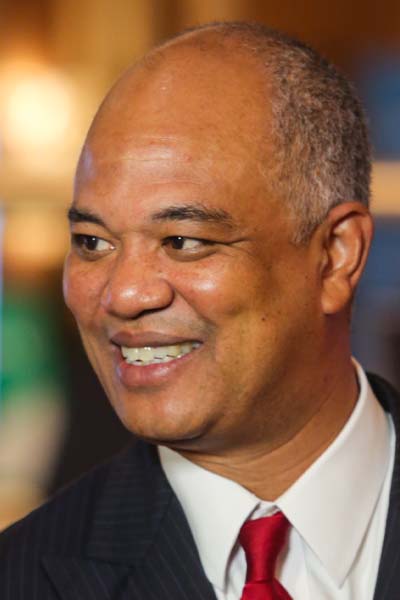Office of Engineering Diversity Programs Named for Hutchins

The Tickle College of Engineering’s (TCE) Engineering Diversity Programs (EDP) was established at UT in 1973 to foster growth and inclusion of what are historically underrepresented populations in engineering: African-American, Hispanic, Native American, Alaskan Native, Pacific Islanders, and female.
In the 50 years since it opened, students have benefitted from the support and community the program provides.
Now, the program itself will be named after one of them.
The Dwight Hutchins Engineering Diversity Programs in the Tickle College of Engineering will continue to help students become world-class engineers, and recognize the accomplishments and support of Hutchins, who graduated from the college with a degree in chemical engineering in 1986.
“It’s so big that words escape me when I think about it,” said Hutchins. “At its core it means that I may be living up to what Fred Brown thought he saw decades ago in a poor, skinny 16-year-old from rural Georgia. I wish I could ask him and thank him. As someone who was just trying to get through Professor Counce’s Chem-E classes, I would have just laughed and shook my head if you’d told me I’d have a program named for me one day.”
For the college it was a way to honor an alum who has stayed connected with his alma mater over the years.
“A strong part of our mission as a land grant institution is to provide access to education for everyone, and help improve the state of Tennessee through research, education and outreach,” said TCE Dean Matthew Mench, the Wayne T. Davis Dean’s Chair of the college. “Dwight Hutchins’ life and career is a tremendous success story for this college and one example of the historical impact of our engineering diversity program, started half a century ago. His generosity will help future generations of students, who might otherwise be unable to come to UT, have access to the transformative impact of a world-class engineering education. Naming the Tickle College of Engineering Diversity Program after Dwight is a tremendous honor for all of us, and will further strengthen our programs for many decades to come.”
Fred Brown served as first director of the office, recruiting Hutchins to UT after his junior year—he met the minimum requirements to enter UT, so he came to UT before he ever began his senior year in his hometown of Rome, Georgia.
Once at UT, Hutchins said the EDP office helped him and others succeed by serving as a foundation for their journeys. It’s an experience he remembers fondly and one he hopes continues for generations.
“The tight-knit community the program builds with support from a caring leadership team is the secret sauce of its success,” Hutchins said. “Belief in the individual, support for them, and a shared sense of mission means a lot when its 3 a.m. and you are staring at an impenetrable problem set. We all need someone to say ‘you can do this; I had the same challenge; I will help, let’s do it together’ at some point. More than a program, this is a community and culture that was started by Fred Brown and James Pippin, and fortunately taken to new levels by Travis Griffin, with the backing of every dean I have known.”
He emphasized the strength of the program by pointing out that engineering is about solving hard problems, whether rural, urban, or in developing countries, and that many of the problems that need solving are local versus global, and affect specific populations.
“Having people from those places and populations gives us a leg up on seeing the problem, wanting to solve it, and having the tools to do so,” Hutchins said. “At the same time, that diversity in experience brings a different perspective to the problem solving process of any team working on any problem.”
After graduation, Hutchins went on to earn an MBA from Northwestern University in 1991 and a master’s in public administration from Harvard University in 1996.
He spent the bulk of his career with Accenture, a leading information services company, rising to become Global Managing director of health and public strategy, then Asia Pacific managing director of management consulting for products, based in Singapore.
Now, he is serving as a senior fellow and adjunct professor at Northwestern University’s Kellogg School of Management, further displaying both the importance he places on education as well as highlighting how he continues to help students.
He credits his background in engineering for spurring on his successful career, saying that an engineering education opens many professional doors, and it prepares you beyond work to many other parts of your life’s journey.
“As you get good at problem solving, you start looking at more than the technical problems at work. You see how technical solutions can be applied around your community and to other issues in the news,” Hutchins said. “You see how fact-based problem solving can even serve non-technical problems. At some point you realize that you have been gifted with the ability to see past the problems and constraints to develop solutions that create big benefits for many people and a personal sense of satisfaction from doing something good.”
He also had a message specifically for students in the Tickle College of Engineering, especially those about to graduate, calling it a ‘momentous milestone’ that means students have the ability and skills to be a successful, high-performing senior executive in many industries and professions.
“While there is more to learn, and more development needed, being a Tickle alum means you are more than capable of mastering what comes next,” he said. “The biggest factors after graduating are what is your ambition and being willing to continue learning and developing, and building on the relationships you have earned by being here.”
As Hutchins has shown, that drive could lead you around the globe.